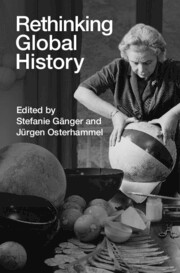Acknowledgements
It was about five years ago – in the summer of 2019 – that we began sketching a first outline of this volume, and we have incurred many debts in the intervening period.
The book would not have been possible without the Balzan Prize, awarded to Jürgen Osterhammel for his contribution to the field of global history in 2018 by the Fondazione Internazionale Premio Balzan in Milan. Balzan projects are commonly directed jointly by the prizewinner and a more junior co-director; Stefanie Gänger happily accepted the invitation to co-direct the project early in 2019. We would like to thank the members of the Balzan General Prize Committee, chaired by Luciano Maiani, for their interest in the project. The foundation’s general secretary, Suzanne Werder, and her staff in Milan have generously provided all sorts of helpful support. We are also very grateful to the former rector of the University of Freiburg, Hans-Joachim Schiewer, and to the Freiburg Institute for Advanced Studies (FRIAS), especially its then director Bernd Kortmann and his successor, Ralf von den Hoff, for agreeing to host the Balzan Project in Global History.
Somewhat unusually, the volume came into its own via an orchestrated, directed process: instead of starting with an open call for papers, we chose an international group of scholars, both senior and at post-doctoral stages in their careers, according to their expertise. We suggested subjects to them, which over the course of long conversations gradually morphed into chapter headings: centrism, direction, teleology, among others. We discussed the authors’ draft papers in two consecutive workshops held in January and September 2021 – online, since the volume came into its own during the years of the pandemic. We are grateful to Jan C. Jansen for first proposing the idea of that procedure, to Peer Vries for his advice in our quest for potential contributors and, of course, to our indefatigable authors, for taking up the challenge. We would like to gratefully acknowledge their encouraging, constructive and stimulating suggestions and feedback, both to one other and on our concept, framework and introduction.
We are also grateful to the fellows and visiting members of the Balzan–FRIAS research group at Freiburg University who have taken the time to discuss project outlines, read parts of the manuscript and suggest changes: Debjani Bhattacharyya, Jesús Bohorquez, Jennifer Eaglin, Benjamin W. Goossen, Enrique Martino, Anna Olenenko and Lianming Wang. At various stages along the publication process, Sven Beckert, Javier Francisco, Chen Hao, Susann Liebich and Martin Rempe joined our conversations about various aspects of the project and contributed valuable suggestions and comments. Tom Theis, Albert Loran and Christian Stenz kindly agreed to listen in and take notes during our workshops, as a basis for later revisions. We presented initial outlines of the project and the introduction for the volume at other venues and seminars too. We are particularly grateful to Jan C. Jansen and Jakob Vogel for the invitation to present drafts of the introduction in Duisburg-Essen in May 2021 and at the Centre Marc Bloch in Berlin in November 2020, and for the comments and feedback we received on these occasions.
We also owe a great debt to Cambridge University Press: to the two anonymous referees for helpful and supportive comments, and to Lucy Rhymer and her team for their interest, kind guidance and valuable suggestions. Our proofreader and adviser on matters of language, Robert Savage, meticulously worked his way through our prose, adjusting our word choice, fixing our grammar and flagging questionable assertions. We are also very grateful to Lea-Marie Trigilia and Tom Theis for providing the perfect back-of-the-book index. The open access publication of this book has been made possible through generous funding by the universities of Konstanz and Heidelberg, and the European Research Council (ERC) under the European Union’s Horizon 2020 research and innovation programme (grant agreement no. 849189).
The book stands at the intersection of global history and historical theory. For Stefanie Gänger, it is part of an ongoing engagement with both the language of global history and with historical epistemology; she owes much to conversations held over the years, first in the Cambridge World History Seminar, then the Konstanz-based Leibniz Prize Group ‘Global Processes’ and more recently, the Heidelberg ‘Cultures of Validation (Geltungskulturen)’ network. For Jürgen Osterhammel, it is the culmination of a long involvement with questions of historical methodology inspired by teachers and colleagues of whom only a few can be mentioned by name: Gangolf Hübinger, Jürgen Kocka, Hartmut Kaelble, Lutz Raphael, Jörn Rüsen, Chris Lorenz and the late Ernst Schulin.

